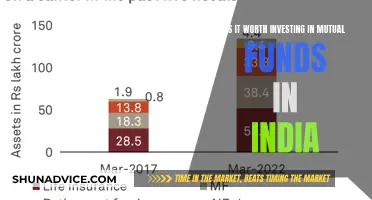
Index funds are a popular investment choice due to their low costs, diversification, and passive management style. However, they also come with certain risks that investors should be aware of before deciding to invest. One of the main risks associated with index funds is their lack of downside protection. While index funds can provide attractive returns during bull markets, they can also perform poorly during prolonged downtrends, leaving investors vulnerable to market corrections and crashes. Additionally, index funds offer limited reactive ability, as they are designed to track a specific market index and cannot pivot away when the market shifts. Investors also have no control over the individual holdings in an index fund, as they are set portfolios. Another risk to consider is the potential for underperformance due to fees, expenses, and tracking errors. Index funds may not perfectly track their target index, especially if they only invest in a sampling of the securities included in the index. Therefore, it is crucial for investors to carefully consider the risks and conduct thorough research before investing in index funds.
| Characteristics | Values |
|---|---|
| Lack of downside protection | Vulnerable to market downside |
| Lack of reactive ability | Unable to act on overvalued or undervalued stocks |
| No control over holdings | Set portfolios |
| Limited exposure to different strategies | Lack of diversification |
| Dampened personal satisfaction | Constantly checking performance |
| Lack of flexibility | Unable to react to price declines |
| Tracking error | May not perfectly track its index |
| Underperformance | May underperform due to fees, expenses, trading costs and tracking error |
What You'll Learn

Lack of downside protection
Index funds are a type of mutual or exchange-traded fund (ETF) that tracks the performance of a market index, such as the S&P 500, by holding the same stocks or bonds or a representative sample of them. They are defined as investments that mirror the performance of benchmarks like the S&P 500 by mimicking their makeup.
Index funds are popular among investors because they offer a simple, no-fuss way to gain exposure to a broad, diversified portfolio at a low cost. They are passively managed and often have low expense ratios.
However, one of the main risks of investing in index funds is the lack of downside protection. This means that while investors will benefit from the upside when the market is doing well, they are also vulnerable to the downside during market corrections and crashes.
During prolonged downtrends, index funds can perform poorly in line with the broader market. Investors with heavy exposure to stock index funds can choose to hedge their exposure by shorting S&P 500 futures contracts or buying a put option against the index. However, these strategies can be complex and may not always be effective.
Additionally, index funds may not be able to react advantageously to market changes. For example, if a stock becomes overvalued, it will carry more weight in the index, even though astute investors would want to lower their portfolios' exposure to that stock.
The lack of downside protection in index funds can leave investors vulnerable to market downturns and underperformance. It is important for investors to carefully consider the risks and potential benefits before investing in index funds.
Private Funds Group: Investment Banking's Private Wealth
You may want to see also

Lack of reactive ability
Index funds are a passive investment strategy, meaning they don't allow for advantageous behaviour. This lack of reactive ability is one of the main risks of investing in an index fund.
Index funds are designed to track a market index, such as the S&P 500, by holding the same stocks or bonds or a representative sample of them. This means that if a stock becomes overvalued, it will actually start to carry more weight in the index. This is when astute investors would want to be lowering their portfolios' exposure to that stock. However, if you invest solely through an index, you won't be able to act on that knowledge.
For example, if you have a clear idea that a particular stock is overvalued or undervalued, you won't be able to do anything about it if you're invested in an index fund. This is because indexes are set portfolios, and investors have no control over the individual holdings.
This lack of reactive ability can be a significant disadvantage, especially for investors who want to be able to act on their knowledge of the market. It's important to consider this risk before investing in an index fund, as it can impact your ability to make informed decisions about your portfolio.
Additionally, the passive nature of index funds means they can't pivot when the market shifts and may underperform during prolonged downtrends. They also lack the flexibility to react to price declines in the securities in the index.
While index funds offer broad market exposure and diversification, their passive nature can limit an investor's ability to react to market changes and individual stock performance.
A Guide to Investing in Mutual Funds
You may want to see also

No control over holdings
Index funds are set portfolios, meaning that investors have no control over the individual holdings in the portfolio. While indexes may be low-cost and diversified, they prevent investors from seizing opportunities elsewhere.
For example, you may have specific companies that you like and want to own, such as a favourite bank or food company that you have researched and want to buy. Similarly, in everyday life, you may have experiences that lead you to believe that one company is markedly better than another. Perhaps it has better brands, management, or customer service. As a result, you may want to invest in that company specifically and not in its peers.
At the same time, you may have ill feelings toward other companies for moral or other personal reasons. For instance, you may disagree with the way a company treats the environment or the products it makes. Your portfolio can be augmented by adding specific stocks you like, but the components of an index portion are out of your hands.
Index funds are designed to mirror a specific market, and they decline in value when the market does. They are criticised for automatically including all the securities in an index, meaning they may invest in overvalued or fundamentally weak companies, and leave aside greater weightings of assets that could provide better returns.
Index funds are also subject to market swings and lack the flexibility of active management. They are, however, often favoured for their consistent performance and are now a staple in many investment portfolios.
Best Index Funds to Invest in: A NerdWallet Guide
You may want to see also

Lack of flexibility
Index funds are designed to mirror the performance of a specific market index, such as the S&P 500. They are passively managed, meaning they don't involve active stock-picking or market timing. This passive strategy aims to keep costs low but comes with a lack of flexibility.
Index funds are designed to mirror a specific market, so they will decline in value when the market does, and they cannot pivot when the market shifts. This lack of flexibility means they are less able to react to price declines in the securities they track.
Index funds are also criticised for automatically including all securities in an index, meaning they may invest in overvalued or weak companies, and for their use of market-cap weighting, which can lead to a concentration of investments in a few large companies. This can magnify an investor's risk if these companies underperform.
The passive nature of index funds means they are also unable to take advantage of advantageous behaviour, such as reducing exposure to an overvalued stock.
Despite these criticisms, index funds have become increasingly popular due to their low costs, broad diversification, and consistent performance.
Mutual Fund Fees: Understanding the Costs of Investing
You may want to see also

Tracking error
A high tracking error means there was a high deviation in the returns of the index fund and its target index. This could be due to various factors, including the mutual fund expenses, the cash balance of index funds, and problems in buying or selling underlying index stocks. For example, mid-cap and small-cap index funds tend to have higher tracking errors because the companies they invest in have lower liquidity and lower trading volume, making it challenging for fund managers to buy or sell stocks without affecting their price.
On the other hand, a low tracking error indicates that a fund is closely following its benchmark. Index fund managers often opt for passive management to keep the tracking error low. However, whether a low or high tracking error is desirable depends on the objectives of the investment. For instance, investors might prefer a high tracking error if there is a degree of outperformance or a low tracking error during consistent underperformance.
Broad index funds, such as the S&P 500, are generally good at minimising tracking errors. As of July 2024, Fidelity's Nasdaq Composite Index Fund (FNCMX) had a 10-year average annual return of 16.37% versus 16.34% for the Nasdaq composite, a negligible 0.03% difference.
Understanding New Fund Offers: A Guide to Smart Investing
You may want to see also
Frequently asked questions
Like any investment, there are risks involved with index funds. Here are some of the potential risks to consider:
- Lack of Downside Protection: Index funds do not provide protection from market corrections and crashes when an investor has high exposure to stock index funds.
- Lack of Reactive Ability: Index funds do not allow for advantageous behaviour. If a stock becomes overvalued, it carries more weight in the index, which is the opposite of what investors would want.
- No Control Over Holdings: Index funds are set portfolios, meaning investors cannot control the individual holdings in the portfolio.
- Single Strategy Only: Index funds may not provide access to a diverse range of strategies, limiting exposure to different approaches.
- Underperformance: An index fund may underperform its index due to fees, expenses, trading costs, and tracking errors.
- Tracking Error: An index fund may not perfectly track its index, especially if it only invests in a sample of the securities in the market index.
- Lack of Flexibility: An index fund may have less flexibility than a non-index fund to react to price declines in the securities included in the index.
- High Concentration in a Few Stocks: In recent years, a small number of large companies have come to dominate major market indexes, which can impact the performance of index funds that track these indexes.
It's important to carefully consider these risks and conduct thorough research before investing in index funds.







